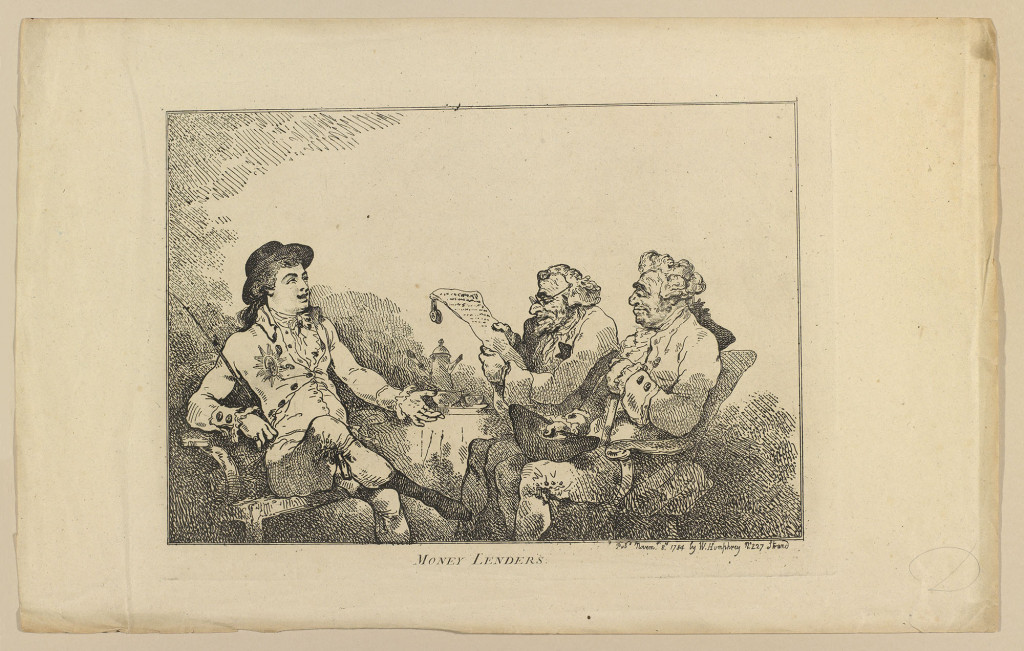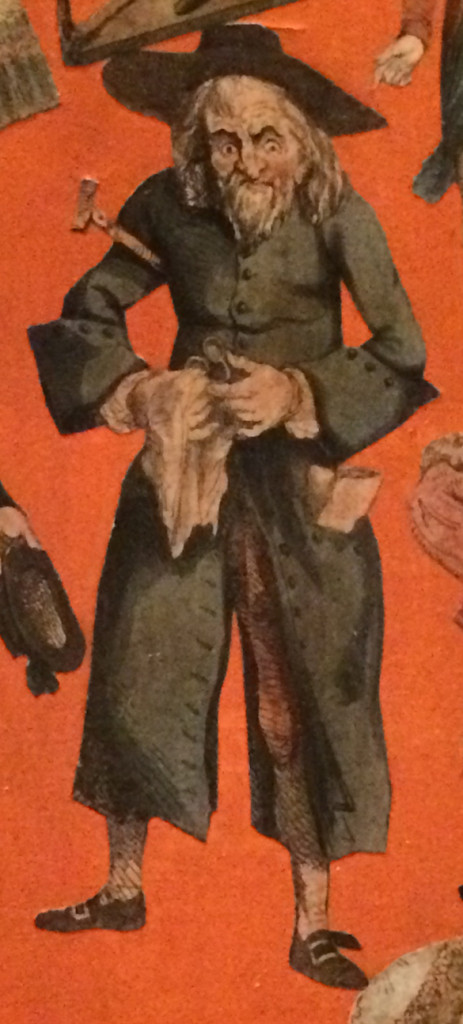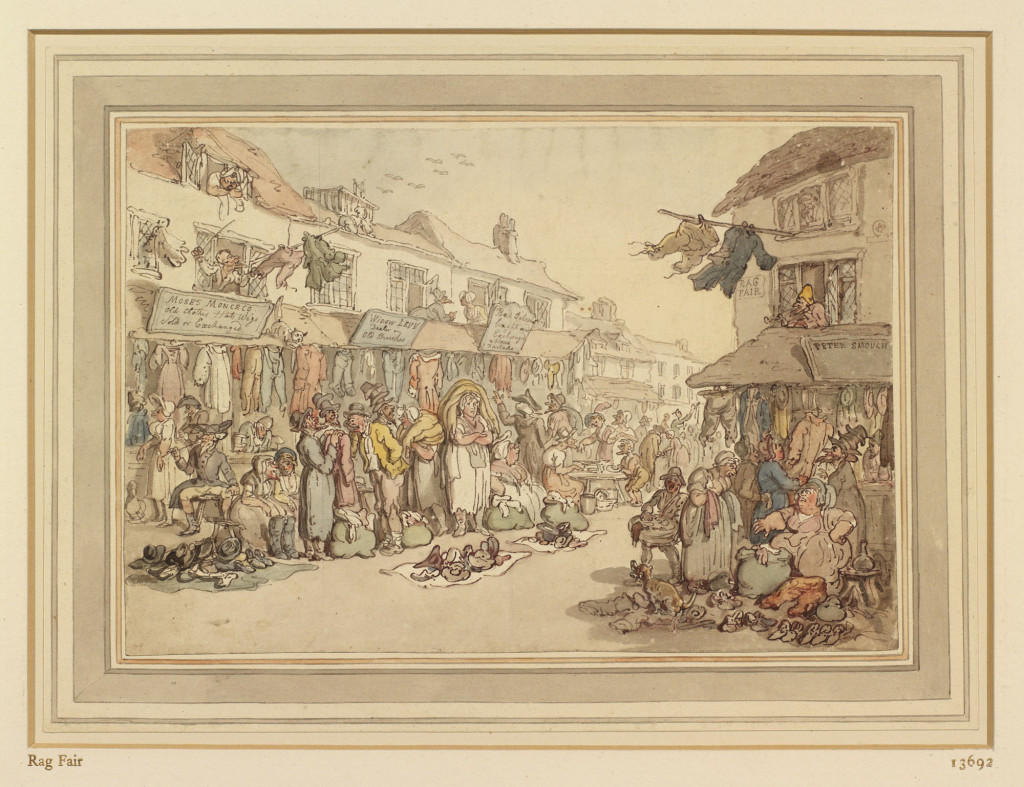On the face of it, the trial of wealthy Derby landlord Philip Potts (aged 46) and prostitute Hannah Vallance (aged about 50) for robbing and seriously injuring Abraham Corcus, is some cause for admiration, if not celebration. The victim, a young Portuguese Jew, probably an itinerant pedlar, was saved, possibly from death, by the actions of three neighbours who heard his screams for help (presumably in Ladino, the language of the Sephardi, or in Portuguese – he did not speak English); and the good burgers of Derby paid for the prosecution of his attackers, even providing an interpreter “of the same tribe and country” so that he could give evidence in court. Robbery in a dwelling house was a capital crime and at the Derby Assizes in March 1817, after the facts were given and Philip Potts claimed not to remember the incident because he had been so drunk, the jury found the defendants guilty and a sentence of death was passed on them.
The criminal register for Derbyshire shows that they were both respited and transported for life to Australia.
In July Hannah Vallance departed for Australia aboard the Friendship, whose surgeon recorded his opinion of her: “Behaves well, but is of a bad disposition.” Her occupation is recorded as “housekeeper.” In 1821 she was reported in Hobart as being drunk and disorderly; in 1829, while working for Jesse Pullen, she was charged with receiving stolen linen (the case was dismissed for lack of evidence) but soon afterwards she was sent to the House of Correction for “improper conduct”; in 1832 she married Henry Pullen, presumably some relation of her former master; and in 1835 she was recommended for a conditional pardon.1 Her date of death is unknown.
Potts departed for Australia on the Ocean in August 1817. The ship’s surgeon, to whom he had complained of chest pains, described him as of “very full habit” and “inclined to corpulence.” Potts died in New South Wales in 1820.
Hannah Vallance departed for Australia in July aboard the Friendship, whose surgeon recorded his opinion of her: “Behaves well, but is of a bad disposition.” Her occupation is recorded as “housekeeper.” Her trajectory after that was variable. In 1821 she was reported in Hobart as being drunk and disorderly; in 1829, while working for Jesse Pullen, she was charged with receiving stolen linen (the case was dismissed for lack of evidence) but soon afterwards she was sent to the House of Correction for “improper conduct”; in 1832 she married Henry Pullen, presumably some relation of her former master; and in 1835 she was recommended for a conditional pardon.

Thomas Rowlandson, Money Lenders, 1784. A young man (the Prince of Wales) requests cash from two caricatured Jewish moneylenders. Royal Collection Trust © Her Majesty Queen Elizabeth II 2016
It is possible that the victim, Abraham Corcus, a young man “of interesting appearance,” as the newspaper report phrased it, was not merely an “itinerant Portuguese Jew” but a member of the Corcos family. The Corcoses were prominent merchants, feather importers from Essouaria (then called Mogador), Morocco. Members of the Corcos family are found in Whitechapel through the 19th century.2 Perhaps we was alone in Derby on commercial business for his family. There are few records available through the usual channels. The only one I can find is for an Abraham Corcos, who died in London in 1841 but I cannot tell if this is the right man.

Cut-outs on a screen of Thomas Rowlandson cartoons.
In 1800 England had between 20,000 and 25,000 Jewish inhabitants, most of them from Holland and Germany, and 60 per cent of whom lived in London. Wealthy Jews tended to be involved in wholesale commerce, brokerage, stock-jobbing and trade in precious stones, with the middle classes operating as shopkeepers, silversmiths and watchmakers. At the bottom end of the social scale were the artisans — pencil-makers, tailors, hatters, embroiderers, glass-engravers, diamond-polishers, necklace-makers. Newcomers traded in either old clothes or peddling. In London old clothes dealers based themselves outside the City boundaries in the East End – where accommodation was cheap and they did not fall foul of the legal restrictions governing where Jews could live. At the end of the century there were 1,500 Jewish old clothes men in London alone, many of them operating in Rag Fair, or Rosemary Lane, near the Tower of London.
If Abraham Corcos was not a scion from the Moroccan family, he may indeed have been a pedlar who had arrived in England at the tail end of a wave of refugees fleeing Spain and Portugal. Although the worst excesses of the Inquisition had by then abated, Jews continued to cite it in their Aliens Certificates as the reason for their coming to England.3 He was carrying a considerable sum of money and three watches, and appears to have been unaccompanied.
By the time of the Regency, itinerant Jewish pedlars were a familiar sight throughout England, and Jewish congregations in provincial cities and towns were beginning to grow. There was no Jewish community in Derby who could have been of assistance to Abraham Corcus and by 1850 they numbered only five (probably all Ashkenazi Jews who had fled the European revolutions of 1848).
There is obviously much more to know about this intriguing incident. All pointers are welcome, so if you can shed any light don’t feel shy about commenting.
The Observer, 30 March 1817
DERBY LENT ASSIZES – March
ROBBING AND MAL-TREATING A JEW.
This was a case of novelty, and of some interest in the country, and excited curiosity of a great concourse of spectators. The trial lasted from noon until about half past ten at night.
Philip Potts, a person of considerable freehold property, consisting of houses in the town of Derby, was indicted with Hannah Valence, a prostitute, the keeper of an infamous house &c., for robbing an itinerant Portuguese Jew, by forcibly and feloniously taking from his person a pocket-book, containing two 5l. [£5] notes, two 1l. [£1] notes, 3 silver watches, and 16d. in silver coin, on the evening of the 18th Nov. last. The first witness was Abraham Corcus, (the prosecutor) a young man of interesting appearance, unacquainted with the English language and examined through the medium of an interpreter, of the same tribe and country. These, to the honour of the Mayor and Corporation of Derby, have been supported, ever since the assault and robbery, for the purpose of instituting a criminal prosecution directed at the expence of the Corporation. By the statement of the Jew, it appeared, that he was inticed to the house of Potts (being an infamous house) by the female prisoner. They brought a bottle of Madeira, and filling out two glasses, requested him to drink, which he declined. Before many minutes had passed, Potts accused the Jew of stealing his watch. This the Jew denied, offering to be searched. Potts then fell upon him with great violence, assisted by the female prisoner, having previously locked the outer doors, both back and front. The witness then called out help, help, and struggled as much as he could. They, however, succeeded in throwing him down, and taking his property from his person, threatening with horrid imprecations to take his life. Hannah Valence seized the poker, and struck the prisoner [Corcus] with it; whilst Potts was beating him, Mrs. Valence snatched up a lighted candle, which she thrust in the prosecutor’s face, & set fire to his beard; Potts afterwards threw him down upon the floor, and struck him many violent blows; his forehead was indented with the point of the poker, his ribs and several parts of his body were severely bruised; he had not yet recovered the effects of the violence, being very unwell with a fever and spitting of blood. This statement was corroborated by the following witnesses, John Francis, Francis Saunders, and Charles King, the latter a constable, who was called in. The witnesses hearing cries of great alarm, ran to the house and found the doors locked, which, however, they burst open, and found the Jew lying on the floor, Potts beating him unmercifully, and persisting in the assertion that he had robbed him of his watch; Mrs Potts, wife of the prisoner, made the same charge, & that she saw Corcus take her husband’s watch from his fob. This charge, however, was totally disproved upon searching all parties; for Pott’s watch was found in the knee of his breeches, & 3 watches belonging to the Jew concealed about him, as also a quantity of silver coin, corresponding with that the Jew had lost. The pocket-book was found up stairs in prisoner’s house [sic], but in which there remained only two 1l. notes, the two 5l. notes having never since been found. The surgeon who attended the Jew, by order of the Magistrates, proved the several wounds and bruises which he had received, together with fever and spitting of blood, which had greatly endangered his life, for which he was attending him.
The prisoner, Potts, in his defence alleged that drunkenness, on the eve in question, had so entirely bereaved him of all reflection, he knew not what had passed; that nothing was father from his intention than to wrong the Jew of the value of one farthing.
Serjeant Copley, and Mr. Denman, his Counsel, called ten or twelve witnesses to the fact of his faving drank a great deal of liquor that evening; also to his character. On a cross-examination by Mr Clarke, sen and Mr Clarke, jun. for the prosecution, witnesses could not pledge themselves for his general character. They were chiefly his tenants. One of them said, he had but a middling good character. Mr Clarke: ” You mean by that he kept a bad house.” Witness did not deny that fact. Hannah Valence no one denied being a disreputable female.
The Jury found the prisoners both guilty.


Leave a Reply